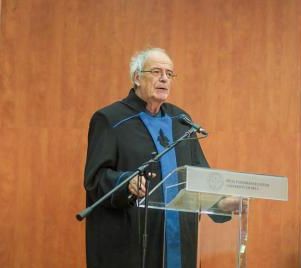Prof. Dr. Ekkehard Nuissl is honorary doctor of the University of Pécs since 9 November 2016.

Curriculum vitae:
Born in 1946, Prof. Dr. Dr. h.c. Ekkehard Nuissl von Rein studied sociology and pedagogy. He was manager of the Heidelberg Institute for educational research and director of the Adult Education Institute (Volkshochschule) in Hamburg. Since 1991 he has been serving as director of the German Institute for Adult Education (DIE) in Bonn. He represented Germany at the OECD, the UNESCO, at the European Conference on lifelong learning and the European Commission in Brussels. In 1998, he was elected president of the European Research and Development Institutes of Adult Education (ERDI); since 2003 he is serving as past-president. From 1998 to 2004 he represented the Leibniz-Association as vice-president. Since 2003 he has been teaching at the University of Duisburg-Essen. In 2006 he was elected member of the International Adult and Continuing Education Hall of Fame. Several of his more than 600 publications are available in English and other European languages.
Main work areas:
Lehr und Lernforschung - research on teaching and learning
Weiterbildungspolitik – further education policy
Internationale Erwachsenenbildung – international adult and continuing education
Internationale Bildungspolitik - international educational policy
Evaluationsforschung – evaluation research
Institutionenforschung – organizational research
"Competent adult educators". Competences and their Acknowledgement.
A short part of the Inauguration Speech of Prof. Dr. Ekkehard Nuissl von Rein before taking Honorosis Causa title from the Rector of the University of Pécs
It is not at all surprising that most influential international organisations, like the UNESCO, OECD and the EU, signal nowadays underline the importance of quality education to be developed. Not only rising the number of learners, but also the performance of learners may reflect the competitiveness of a country or a region. I presume the performance of adult learners strongly depend on available high quality adult learning professionals, we today would call adult educators.
Competencies of adult educators depend, up to a certain extent, of their higher education and it is more than important today to develop, innovate and research how adult educators are educated and trained within higher education institutions. One element of our scrutiny is to analyse and compare curricula of BA and MA in Adult Education in order to be able to point out where and what to change, improve or modify referring to content, structure, methodologies, assessment, etc.
In the last ten years, I have dealt with the comparative studies of curricula of MA programmes in Adult Education across Europe so as to develop a European Masters in Adult Education. Three years ago, the University joined a distinguished project called European Studies and Research in Adult Learning and Education (ESRALE) together with nine other universities and two professional bodies (DIE and VPL) to jointly develop a programme to educate and train “Competent Adult Educators”. In my inauguration speech, I am going to describe some findings of ESRALE, the project I have led, around competences and their acknowledgement, both in professional and in academic contexts.






